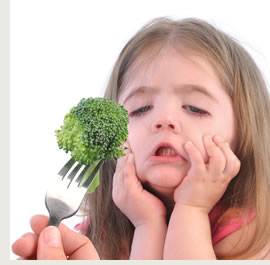|
 Dealing with fussy eaters can be hugely stressful for parents. The natural desire of mums and dads is to make sure their child is fit and healthy and getting all the nutrients he or she needs for good development and health. So if your child is not playing ball and only eats certain things or just wants non-nutritious food, it's likely you feel guilty, ashamed, abnormal or just frustrated as hell that you can't get your child to eat "normally". Dealing with fussy eaters can be hugely stressful for parents. The natural desire of mums and dads is to make sure their child is fit and healthy and getting all the nutrients he or she needs for good development and health. So if your child is not playing ball and only eats certain things or just wants non-nutritious food, it's likely you feel guilty, ashamed, abnormal or just frustrated as hell that you can't get your child to eat "normally".
The fact is that all children have their own ways of dealing with food and develop tastes for certain things at different times. Most will eventually settle down and eat the same as everyone else and it's natural to not like certain foods – that's what makes us all different.
We all have stories…some hate mushrooms others won't eat anything orange or can't stand cream or anything strawberry-flavoured or maybe a phobia to peas or brussel sprouts.
As Fruit Juice Australia's nutritionist Kristen Beck says, Picky eating (or food neophobia) is by far the most reported feeding problem in early childhood. So you are not alone.
Below Kristen outlines Picky Eating and gives some great tips on how to lessen the impact of food fussiness.
From around the age of two to three years, children develop a general tendency to reject new foods. This tendency is sometimes termed 'fussiness' however it is a normal part of development.
While it has been shown that children with food neophobia tend to have a higher intake of saturated fats and less dietary variety than children without food neophobia, there is conflicting information about the impact of this on children's health. Some studies suggest that some children who display picky eating tendencies have poor growth or weight gain; however other studies find no adverse development impact. Severely decreased dietary variety of serial picky eaters undoubtedly limits their access to vital nutrients.
While the overall health impact of fussy or picky eating on children's health is debatable, one thing is not - the stress caused in other family members. In a review of several case studies of picky eaters, family members reported that meal times can cause immense anxiety and parents of young picky eaters reported frequent meal-time battles.
Tips to lessen the impact of picky eating
Parents and caregivers of picky eaters can encourage their children to eat new foods by:
- Eating as many different foods as possible
In order for a child to eat a wide variety of foods, many types of foods must first be available to them. The absence of particular foods can suggest that they are unimportant and the child may therefore form a negative association about these foods.
- Try serving foods in different forms
Consider introducing things like fruits and vegetables in different forms – raw rather than cooked, dried fruits rather than fresh, or fruit and / or vegetable juices to get little ones used to different tastes. For example, a small (120mL) glass of 100% fruit juice provides important vitamins and minerals and can be considered as one dietary serving of fruit (but be sure to make the other serving fresh fruit) – of course water should be the first choice of hydration throughout the day.
- Introduce new foods in a familiar environment
A happy, unhurried atmosphere free of conflict will certainly improve appetite. Parents and caregivers who serve meals in a relaxed and casual manner without anxiety provide a climate that minimises a child's stress level.
- Do not couple picky eaters with other picky eaters
When problem picky eaters are introduced to new foods on their own or in a group, food acceptance is relatively high; however in the presence of other picky eaters they are much less likely to accept new foods. Girls in particular model their eating patterns from other children in their peer group (i.e., I'll have what she's having).
- Avoid power struggles
As infuriating as it can be to prepare and present a well – balanced, nutritional meal to your picky eater only to once again have it rejected, you have to keep your cool! Children who are pushed to try new foods are less likely to eat those foods again in comparison to children who are left to decide for themselves.
For more information on Kirsten and for more Health & Nutrition tips, go to the Fruit Juice Australia website.
|

 Dealing with fussy eaters can be hugely stressful for parents. The natural desire of mums and dads is to make sure their child is fit and healthy and getting all the nutrients he or she needs for good development and health. So if your child is not playing ball and only eats certain things or just wants non-nutritious food, it's likely you feel guilty, ashamed, abnormal or just frustrated as hell that you can't get your child to eat "normally".
Dealing with fussy eaters can be hugely stressful for parents. The natural desire of mums and dads is to make sure their child is fit and healthy and getting all the nutrients he or she needs for good development and health. So if your child is not playing ball and only eats certain things or just wants non-nutritious food, it's likely you feel guilty, ashamed, abnormal or just frustrated as hell that you can't get your child to eat "normally".